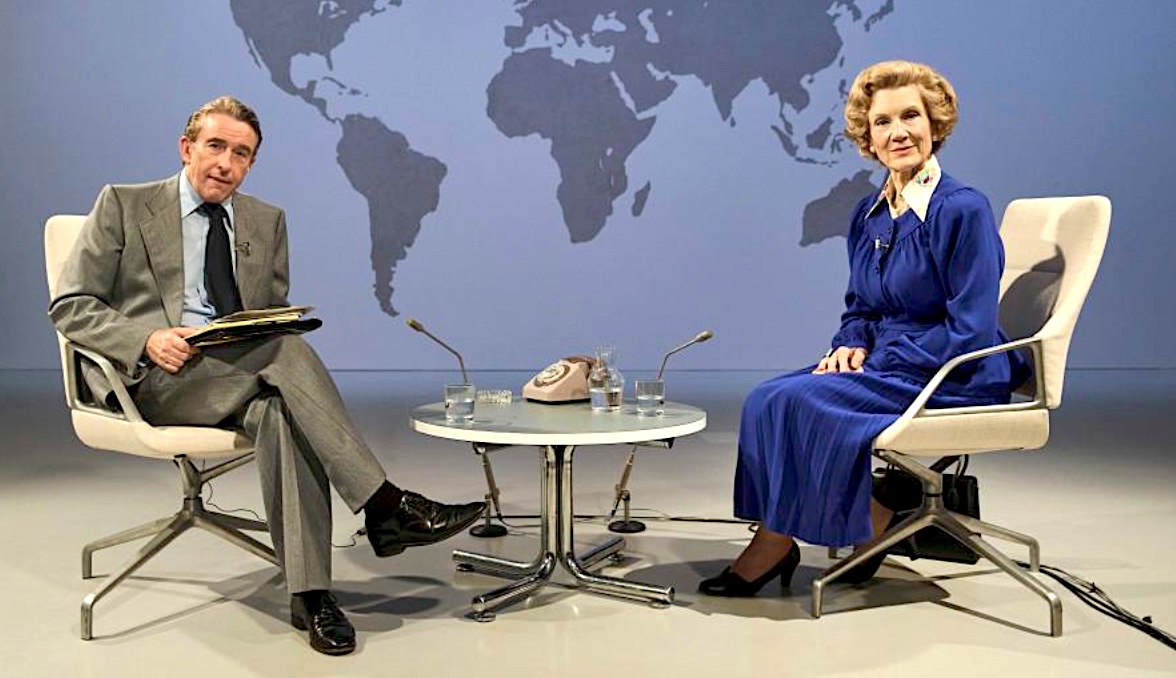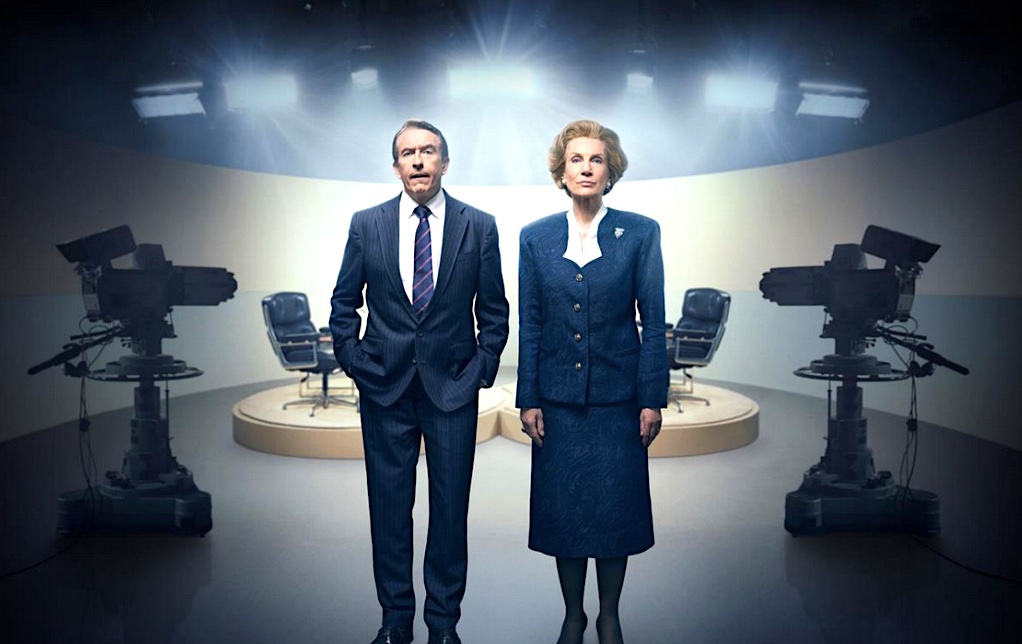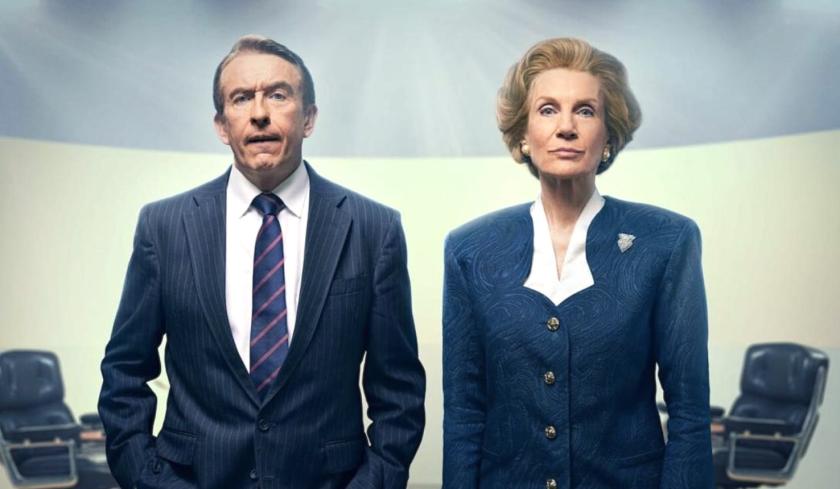The thesis underlying this two-part drama is that Brian Walden’s 1989 TV interview with Prime Minister Margaret Thatcher marked the end of the long-form, forensic political interview, while also being a catalyst for Thatcher’s resignation a year later. Stephen Frears directs, and James Graham wrote it, basing it on the book Why Is This Lying Bastard Lying To Me? by Rob Burley, a producer of a string of political programmes for ITV and the BBC.
At least it’s not yet another rehash of the Maitlis-Prince Andrew interview, though one suspects that’s probably what triggered its creation. But this notion of making TV dramas about TV interviews does have an air of navel-gazing self-indulgence about it. Here, the interview provides its moments of high drama, especially the climactic scene where Walden quizzes Thatcher about how she might have avoided the resignation of her chancellor, Nigel Lawson, had she been less pig-headed and overbearing. The PM stands firm, stressing her "very strong convictions which are a combination of reason and emotion", though the minutiae of how Lawson fell out with her economics adviser Alan Walters feel fairly meaningless all these years later.
 The more interesting aspects of Brian and Maggie are its depiction of how a personal and professional relationship grew up between the protagonists. Walden, an ex-grammar school boy and previously the Labour MP for Birmingham Ladywood, felt a kinship with both Thatcher’s politics and her self-made career from modest beginnings, and was even tempted to cross the floor of the Commons to join the Tories. He didn’t, but quit politics in 1977 for a new career in journalism and TV, notably London Weekend’s Weekend World and then The Walden Interview. En route to becoming recognised as TV’s most accomplished interrogator, in the tradition of TV’s “Grand Inquisitor” Robin Day, he interviewed Thatcher frequently, and they struck up a genuine friendship.
The more interesting aspects of Brian and Maggie are its depiction of how a personal and professional relationship grew up between the protagonists. Walden, an ex-grammar school boy and previously the Labour MP for Birmingham Ladywood, felt a kinship with both Thatcher’s politics and her self-made career from modest beginnings, and was even tempted to cross the floor of the Commons to join the Tories. He didn’t, but quit politics in 1977 for a new career in journalism and TV, notably London Weekend’s Weekend World and then The Walden Interview. En route to becoming recognised as TV’s most accomplished interrogator, in the tradition of TV’s “Grand Inquisitor” Robin Day, he interviewed Thatcher frequently, and they struck up a genuine friendship.
Steve Coogan fills the Walden role ably enough, and makes a decent stab at reminding us of some of Walden’s strange quirks of pronunciation, while Harriet Walter is the latest actress bold enough to step into the shoes of the Iron Lady. The lineage of stage and screen Thatchers is now rather illustrious – Mrs T has almost become the Lady Bracknell for later generations – and stretches from Haydn Gwynne, Andrea Riseborough and Sylvia Syms to Patricia Hodge, Meryl Streep, Lesley Manville, Lindsay Duncan and Gillian Anderson. Ms Walter resembles her subject rather less than some others, but has done an excellent job on the voice. Or that voice, if you will. Meanwhile various Tory politicos – Lawson, Geoffrey Howe, Bernard Ingham, Ian Gow – pop in and out of the action to no great effect.
 Most surprising is that Graham has written a fairly sympathetic Thatcher. While outlining her preoccupations with the evils of socialism and “rolling back the state” to allow citizens to spend their own money how they want to, he presents us with a woman who’s prepared to stand her ground and debate her policies and beliefs, treating her inquisitor as an equal. “I see these conversations as opportunities,” she tells Walden. For his part, he says: “She actually answers the bloody question. I find it refreshing.” She strikes an egalitarian chord when she explains to him privately how she’s acutely conscious of not being part of the cliquey Conservative elite – “I’m painfully aware that one mistake and they will have me out.”
Most surprising is that Graham has written a fairly sympathetic Thatcher. While outlining her preoccupations with the evils of socialism and “rolling back the state” to allow citizens to spend their own money how they want to, he presents us with a woman who’s prepared to stand her ground and debate her policies and beliefs, treating her inquisitor as an equal. “I see these conversations as opportunities,” she tells Walden. For his part, he says: “She actually answers the bloody question. I find it refreshing.” She strikes an egalitarian chord when she explains to him privately how she’s acutely conscious of not being part of the cliquey Conservative elite – “I’m painfully aware that one mistake and they will have me out.”
By contrast, Walden’s TV production team are presented as being knee-jerk anti-Thatcherites. They also get lumbered with having to trot out bits of exposition in case we’re missing the point. “We’ve never seen her like this before, on the ropes!” says one, in the middle of the decisive interview. Still, on the upside, we do get to hear again the celebrated Weekend World theme tune, a chunk of Mountain’s "Nantucket Sleighride".















Add comment